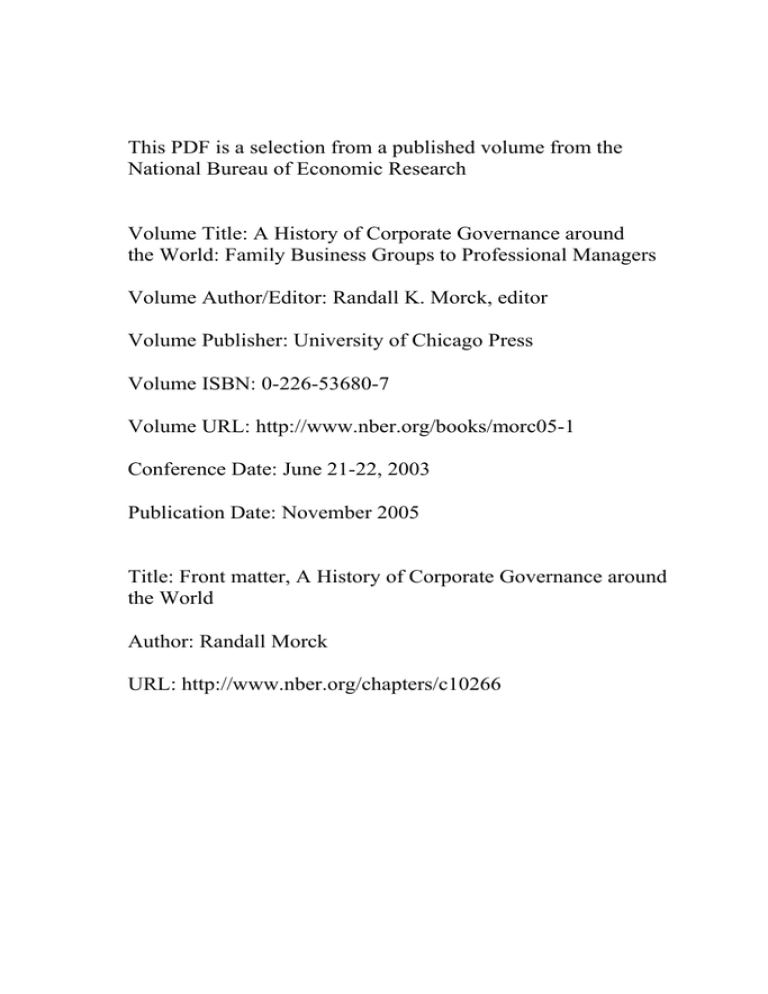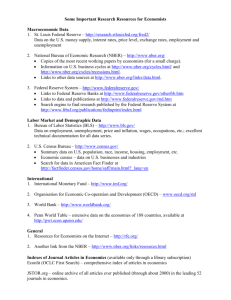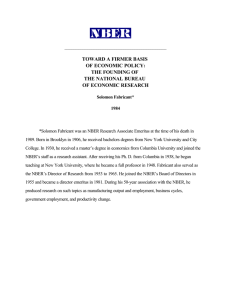
This PDF is a selection from a published volume from the
National Bureau of Economic Research
Volume Title: A History of Corporate Governance around
the World: Family Business Groups to Professional Managers
Volume Author/Editor: Randall K. Morck, editor
Volume Publisher: University of Chicago Press
Volume ISBN: 0-226-53680-7
Volume URL: http://www.nber.org/books/morc05-1
Conference Date: June 21-22, 2003
Publication Date: November 2005
Title: Front matter, A History of Corporate Governance around
the World
Author: Randall Morck
URL: http://www.nber.org/chapters/c10266
A History of Corporate Governance
around the World
A National Bureau
of Economic Research
Conference Report
A History of Corporate
Governance around
the World
Family Business Groups to
Professional Managers
Edited by
Randall K. Morck
The University of Chicago Press
Chicago and London
Randall K. Morck is the Stephen A. Jarislowsky Distinguished
Chair in Finance in the Department of Finance and Management
Science at the University of Alberta and a research associate at the
National Bureau of Economic Research. His publications are
numerous and include the NBER volume Concentrated Corporate
Ownership (2000).
The University of Chicago Press, Chicago 60637
The University of Chicago Press, Ltd., London
© 2005 by the National Bureau of Economic Research
All rights reserved. Published 2005
Printed in the United States of America
14 13 12 11 10 09 08 07 06 05
1 2 3 4 5
ISBN: 0-226-53680-7 (cloth)
Library of Congress Cataloging-in-Publication Data
A history of corporate governance around the world : family business
groups to professional managers / edited by Randall K. Morck.
p. cm. — (A National Bureau of Economic Research
conference report)
Includes bibliographical references and index.
ISBN 0-226-53680-7 (alk. paper)
1. Corporate governance—History. I. Morck, Randall. II. Series.
HD2741 .H568 2005
658.4′09—dc22
2005010526
o The paper used in this publication meets the minimum requirements of
the American National Standard for Information Sciences—Permanence
of Paper for Printed Library Materials, ANSI Z39.48-1992.
National Bureau of Economic Research
Officers
Michael H. Moskow, chairman
Elizabeth E. Bailey, vice-chairman
Martin Feldstein, president and chief
executive officer
Susan Colligan, vice president for
administration and budget and corporate
secretary
Robert Mednick, treasurer
Kelly Horak, controller and assistant
corporate secretary
Gerardine Johnson, assistant corporate
secretary
Directors at Large
Peter C. Aldrich
Elizabeth E. Bailey
John H. Biggs
Andrew Brimmer
John S. Clarkeson
Don R. Conlan
George C. Eads
Jessica P. Einhorn
Martin Feldstein
Jacob A. Frenkel
Judith M. Gueron
Robert S. Hamada
George Hatsopoulos
Karen N. Horn
Judy C. Lewent
John Lipsky
Laurence H. Meyer
Michael H. Moskow
Alicia H. Munnell
Rudolph A. Oswald
Robert T. Parry
Richard N. Rosett
Marina v. N. Whitman
Martin B. Zimmerman
Directors by University Appointment
George Akerlof, California, Berkeley
Jagdish Bhagwati, Columbia
Ray C. Fair, Yale
Michael J. Brennan, California, Los Angeles
Glen G. Cain, Wisconsin
Franklin Fisher, Massachusetts Institute
of Technology
Saul H. Hymans, Michigan
Marjorie B. McElroy, Duke
Joel Mokyr, Northwestern
Andrew Postlewaite, Pennsylvania
Uwe E. Reinhardt, Princeton
Nathan Rosenberg, Stanford
Craig Swan, Minnesota
David B. Yoffie, Harvard
Arnold Zellner (Director Emeritus),
Chicago
Directors by Appointment of Other Organizations
Richard B. Berner, National Association
for Business Economics
Gail D. Fosler, The Conference Board
Richard C. Green, American Finance
Association
Arthur B. Kennickell, American Statistical
Association
Thea Lee, American Federation of Labor
and Congress of Industrial Organizations
William W. Lewis, Committee for Economic
Development
Robert Mednick, American Institute of
Certified Public Accountants
Angelo Melino, Canadian Economics
Association
Jeffrey M. Perloff, American Agricultural
Economics Association
John J. Siegfried, American Economic
Association
Gavin Wright, Economic History
Association
Directors Emeriti
Carl F. Christ
Lawrence R. Klein
Franklin A. Lindsay
Paul W. McCracken
Peter G. Peterson
Eli Shapiro
Arnold Zellner
Relation of the Directors to the
Work and Publications of the
National Bureau of Economic Research
1. The object of the NBER is to ascertain and present to the economics profession, and to
the public more generally, important economic facts and their interpretation in a scientific
manner without policy recommendations. The Board of Directors is charged with the responsibility of ensuring that the work of the NBER is carried on in strict conformity with this object.
2. The President shall establish an internal review process to ensure that book manuscripts
proposed for publication DO NOT contain policy recommendations. This shall apply both to
the proceedings of conferences and to manuscripts by a single author or by one or more coauthors but shall not apply to authors of comments at NBER conferences who are not NBER
affiliates.
3. No book manuscript reporting research shall be published by the NBER until the President has sent to each member of the Board a notice that a manuscript is recommended for publication and that in the President’s opinion it is suitable for publication in accordance with the
above principles of the NBER. Such notification will include a table of contents and an abstract or summary of the manuscript’s content, a list of contributors if applicable, and a response form for use by Directors who desire a copy of the manuscript for review. Each manuscript shall contain a summary drawing attention to the nature and treatment of the problem
studied and the main conclusions reached.
4. No volume shall be published until forty-five days have elapsed from the above notification of intention to publish it. During this period a copy shall be sent to any Director requesting it, and if any Director objects to publication on the grounds that the manuscript contains
policy recommendations, the objection will be presented to the author(s) or editor(s). In case
of dispute, all members of the Board shall be notified, and the President shall appoint an ad
hoc committee of the Board to decide the matter; thirty days additional shall be granted for
this purpose.
5. The President shall present annually to the Board a report describing the internal manuscript review process, any objections made by Directors before publication or by anyone after
publication, any disputes about such matters, and how they were handled.
6. Publications of the NBER issued for informational purposes concerning the work of the
Bureau, or issued to inform the public of the activities at the Bureau, including but not limited
to the NBER Digest and Reporter, shall be consistent with the object stated in paragraph 1.
They shall contain a specific disclaimer noting that they have not passed through the review
procedures required in this resolution. The Executive Committee of the Board is charged with
the review of all such publications from time to time.
7. NBER working papers and manuscripts distributed on the Bureau’s web site are not
deemed to be publications for the purpose of this resolution, but they shall be consistent with
the object stated in paragraph 1. Working papers shall contain a specific disclaimer noting that
they have not passed through the review procedures required in this resolution. The NBER’s
web site shall contain a similar disclaimer. The President shall establish an internal review process to ensure that the working papers and the web site do not contain policy recommendations, and shall report annually to the Board on this process and any concerns raised in connection with it.
8. Unless otherwise determined by the Board or exempted by the terms of paragraphs 6 and
7, a copy of this resolution shall be printed in each NBER publication as described in paragraph 2 above.
To the boss
Contents
1.
2.
3.
4.
Preface
xi
The Global History of Corporate Governance:
An Introduction
Randall K. Morck and Lloyd Steier
1
The Rise and Fall of the Widely Held Firm:
A History of Corporate Ownership in Canada
Randall K. Morck, Michael Percy, Gloria Y. Tian,
and Bernard Yeung
Comment: Jordan Siegel
The History of Corporate Ownership in China:
State Patronage, Company Legislation, and the
Issue of Control
William Goetzmann and Elisabeth Köll
Comment: Dwight H. Perkins
Corporate Ownership in France: The Importance
of History
Antoin E. Murphy
Comment: Daniel Raff
The History of Corporate Ownership and Control
in Germany
Caroline Fohlin
Comment: Alexander Dyck
65
149
185
223
ix
x
Contents
5.
The Evolution of Concentrated Ownership in India:
Broad Patterns and a History of the Indian
Software Industry
Tarun Khanna and Krishna G. Palepu
Comment: Ashoka Mody
6.
The History of Corporate Ownership in Italy
Alexander Aganin and Paolo Volpin
Comment: Daniel Wolfenzon
7.
A Frog in a Well Knows Nothing of the Ocean:
A History of Corporate Ownership in Japan
Randall K. Morck and Masao Nakamura
Comment: Sheldon Garon
8.
9.
10.
11.
Financing and Control in The Netherlands:
A Historical Perspective
Abe de Jong and Ailsa Röell
Comment: Peter Högfeldt
The History and Politics of Corporate Ownership
in Sweden
Peter Högfeldt
Comment: Ailsa Röell
Spending Less Time with the Family: The Decline of
Family Ownership in the United Kingdom
Julian Franks, Colin Mayer, and Stefano Rossi
Comment: Barry Eichengreen
Why Has There Been So Little Block Holding in
America?
Marco Becht and J. Bradford DeLong
Comment: Richard Sylla
Contributors
Author Index
Subject Index
283
325
367
467
517
581
613
667
671
679
Preface
Let the reader beware that this book differs from most conference volumes,
for it is not a collection of more or less independent research articles.
Rather, each set of authors was asked to provide a history of corporate governance in a given country, beginning as early as necessary to explain how
that country came to its current state. Inevitably, great mercantile families,
politics, and institutional development interact. Each chapter went through
repeated revisions, as one set of authors embraced ideas raised by another
in a long process that ultimately converged on the pages that follow. I am
deeply grateful to the esteemed authors and discussants of this volume,
some of the world’s very best financial economists and economic historians,
who took up my challenge to explore this little-known but critically important research frontier. This volume, quite literally, capitalizes thousands of
hours of their work.
This volume would have been impossible without the financial support of
the University of Alberta School of Business and especially its much acclaimed Centre for Entrepreneurship and Family Enterprise. Logistic and
organizational support from the National Bureau of Economic Research
was also critical to the project’s success, especially to the successful preconference in September 2002 in Cambridge, Massachusetts, and the authors’
and discussants’ conference at Lake Louise, Alberta, in June 2003. Special
thanks are due Helena Fitz-Patrick for stalwartly herding the many busy
contributors toward final versions, and to Brett Maranjian for flawlessly organizing the Cambridge and Lake Louise conferences.
Further financial support permitted the presentation of the papers in this
volume at a second conference in Fontainebleau, France, in January 2004.
For this, many thanks are due the Center for Economic Policy Research
(CEPR), the European Corporate Governance Institute (ECGI), and IN-
xi
xii
Preface
SEAD. Thanks are due Gordon Redding, Silvia Giacomelli, Rosa Nelly
Travino, Javier Suárez, Christine Blondel, Yishay Yafeh, Mark Roe, Erik
Berglöf, Bruce Kogut, Ronald Anderson, Enrico Perotti, Xavier Vives, and
Sabine Klein for serving as discussants of the papers and discussants at
large in Fontainebleau.
The Times of London kindly ran synopses of several of the chapters in
this volume, and many thanks are due their staff, especially Brian Groom
and Paul Betts.
Encouragement throughout from Martin Feldstein, president and CEO
of the National Bureau of Economic Research; Michael Percy, the dean of
the University of Alberta School of Business; and Lloyd Steier, the director
of the Centre for Entrepreneurship and Family Enterprise, was also invaluable. Also providing indispensable help at critical junctures were Marco
Becht, director of the European Corporate Governance Institute; Christine
Blondel, senior research program manager of INSEAD’s Research Initiative for Family Enterprise; Barry Eichengreen, George C. Pardee and
Helen N. Pardee Professor of Economics and Political Science at the University of California at Berkeley; Ludo van der Heyden, Wendel Chaired
Professor for the Large Family Firm and Solvay Professor in Technology
Innovation at INSEAD; and Andrei Shleifer, Whipple V. N. Jones Professor of Economics at Harvard. I am also grateful to Stephen Jarislowsky for
his intellectual encouragement and financial support.
Two anonymous manuscript reviewers provided insightful and keenly
critical comments that greatly improved many of the chapters, especially
those in which I had a hand. More thanks are due Helena Fitz-Patrick of
the National Bureau of Economic Research for patiently guiding us all
toward publication, and to Peter Cavagnaro of the University of Chicago
Press for expertly overseeing the publication process.
Finally, my wife deserves boundless gratitude for her patience and support throughout.


